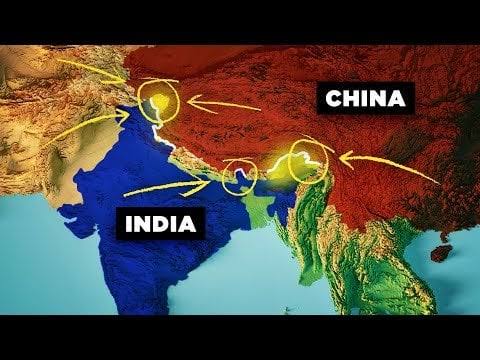Why China suddenly got checkmated by India in South Asia?

Maldivian President Mohamed Muizzu concluded his five-day state visit to India on Thursday, his first state visit to India since assuming office.
Earlier, on October 4, Indian External Affairs Minister Subrahmanyam Jaishankar travelled to Colombo to meet with Sri Lanka’s newly elected president Anura Kumara Dissanayake in an effort to cement relationships with the new Sri Lankan government.
It is evident that India diplomatic approach in adopting a more balanced stance is to continue favourable developments in its relations with neighbours.
In 2024, India faced a setback in the diplomatic relations with its neighbour Maldives, as a group of people fanning undercurrent of anti-India sentiment had got the upperhand in this South Asian island nation.
This had erupted in the open after victory of President Muizzu, a supposedly Pro China politician. After having assumed office, Muizzu swiftly abandoned his predecessor’s “India First” policy, made his first foreign visit to China, and demanded that India withdraw its stationed military technicians from the Maldives within a set time frame.
In Bangladesh, too political turmoil was instigated by certain foreign forces that has created significant obstacles to improving relations between India and the radical controlled interim government.
Meanwhile, in Sri Lanka’s late-September elections, the victory of Anura Kumara Dissanayake, a politician from a Marxist party, has created some uncertain challenges faced by India in its regional diplomacy.
India has moved swiftly in its regional diplomacy which is hindered by a Chinese hegemonic attitude toward South Asia and Pakistani support fir terrorism.
China’s influence in India’s neighbourhood is being countered by Indian policymaking circles with active involvement with its neighbours and by strengthening Indian military infrastructure along the Indo Tibetan Border.
Over the past decade, one defining feature of the Narendra Modi administration’s diplomacy has been its focus on counter agendas aimed at preventing other countries, especially China, from advancing its negative initiatives in South Asia, South East Asia and Middle East.
India has begun promoting its national interests not only in Asia but also in Africa pair the overall welfare of the entire region.
India has been committed to addressing China’s economic influence, preventing other Asian countries from getting entrapped with Chinese loans etc.
It has proposed various initiatives and plans, such as the “Neighbors First” policy, the “Act East” policy and the “Connect Central Asia” policy for its neighbouring countries.It is clear that India’s initiatives towards its neighbours have made tremendous progress, in blocking adverse Chinese influence.
The fundamental reason for this is that New Delhi has conceived of a constructive regional economic, diplomatic and Security initiative. It has been very active in some cooperation initiatives, such as the Bangladesh-Bhutan-India-Nepal project.
Its main purpose is to promote regional connectivity and economic integration. It is also focused on protecting India in the “sphere of influence” at the southern foot of the Himalayas. From the perspective of India’s relations with China, it can be very clearly seen that now Beijing has no military or infrastructural superiority over India along te Indo Tibetan Border. Sooner than later China has to leave occupied Tibet.
In South Asia, India possessed geographical and cultural advantages over China that have translated into stronger regional soft power. India is now using these geopolitical advantages, leveraging with full supply of essential goods, trade and energy supplies to its neighbours as first responder.
This approach, especially during natural calamities has strengthened New Delhi’s influence in the region. India’s inclination toward economic ” diplomacy” with its South Asian neighbours has encouraged these countries to seek new ways to increase their infrastructural development.
They now need not turn instead to World Bank or China for loans or supply chain networks.
Recent changes in international situation and the rising economic and military power of India in conjunction with Modi administration friendly stance toward its neighbours have left China bewildered.
Now if China does not fundamentally change its mind-set, it will continue to be viewed as “an unwelcome big brother,” making it increasingly difficult to earn the respect of these countries.
More directly, Beijing should not regard the Asian region as its “sphere of influence.”…. Indian Ocean Region lies in Indian sphere if influence.




